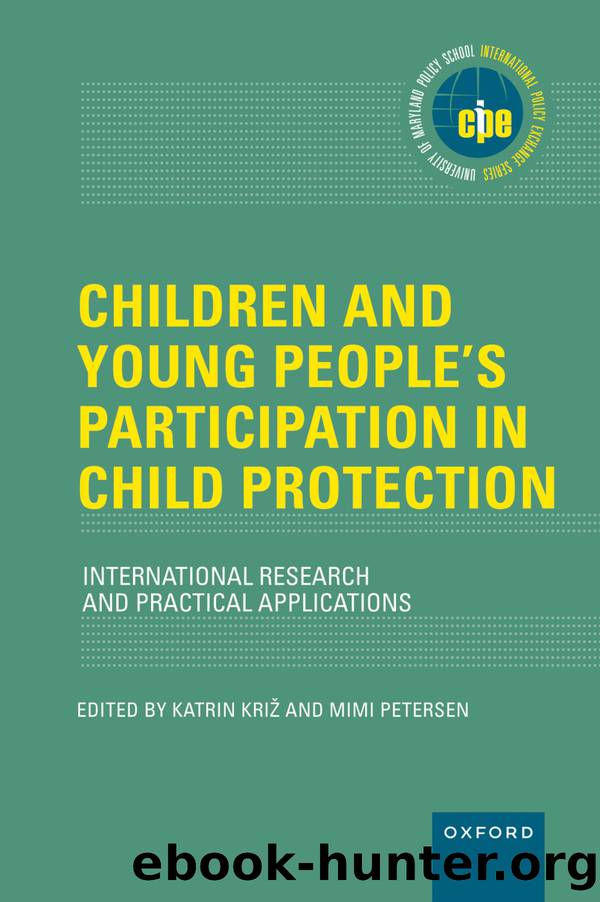Children and Young People's Participation in Child Protection by Katrin Križ

Author:Katrin Križ
Language: eng
Format: epub
Publisher: Oxford University Press
Published: 2023-08-15T00:00:00+00:00
7
Childrenâs Participation in Foster Care in Germany
Daniela Reimer
Introduction
Social work research and practice are highly developed in Germany. In social work practice, it is undisputed that clients should participate in decisions. Practitioners and scholars agree that this aspiration extends to children who have become social work clients (Blandow et al., 1999; Hansbauer & Kriener, 2000; Kriener, 1999). Participation by children in out-of-home care is a normative guideline and can be justified on several levels (Blandow et al., 1999). From a legal perspective, childrenâs participation is crucial because children have the right to participate in all important matters concerning their lives, according to the United Nations Convention on the Rights of the Child (UNCRC; United Nations, 1989) and its implementation under national law. A social work perspective underlines that childrenâs development is something they achieve themselvesâa process that social workers can stimulate and promote if the children are independent actors who share responsibility for it. Childrenâs education and emotional and social development are inconceivable without participation (Wolf, 2006, 2013). Participation is important in terms of child welfare as well. When child welfare workers involve children so they can participate appropriately in decisions about their lives, this can help shield children from stressors and experiences of powerlessness, which could cause them suffering. Childrenâs participation is likely to make their living conditions in care more stable and enables care arrangements that align with childrenâs wishes and fears. Children can then experience more viable foster care arrangements and achieve the stability they need for their development (Reimer & Wolf, 2011).
As this chapter shows, while âparticipationâ is a broad term that is supported by law and professional practice, its implementation is complex. If child welfare workers are to apply the concept of childrenâs participation effectively in professional practice in a way that is useful for children, the term must be operationalized for all practice fields and contexts. In the German foster care system, children and professionals make many decisions in one-on-one meetings. A definition of participation that is suitable for this context needs to be sufficiently nuanced to avoid an either-or approach: without this nuanced definition, participation would only distinguish between participation and nonparticipation instead of recognizing the levels and types of participation necessary in different contexts. (The term âparticipationâ here refers to the balance of power between children and adults.)
On a societal level, childrenâs participation has been shifting. For the past decades, children in Western countries have increasingly been placed in positions of power. For instance, studies in Germany and neighboring countries have shown that children are progressively more involved in decisions about school and family matters and considered relevant discussion partners (see, e.g., Büchner, 1989; Waterstrad, 2015). If the foster care system deliberately aims to achieve participatory practice, it remains in sync with the general debate about childrenâs rights in society and how adults and children should ideally interact with each another.
The practical implementation of childrenâs participation in foster care can prove complex and demanding and raises many questions: What does participation specifically mean
Download
This site does not store any files on its server. We only index and link to content provided by other sites. Please contact the content providers to delete copyright contents if any and email us, we'll remove relevant links or contents immediately.
Spell It Out by David Crystal(36105)
Life for Me Ain't Been No Crystal Stair by Susan Sheehan(35792)
Cecilia; Or, Memoirs of an Heiress — Volume 1 by Fanny Burney(32533)
Cecilia; Or, Memoirs of an Heiress — Volume 2 by Fanny Burney(31931)
Cecilia; Or, Memoirs of an Heiress — Volume 3 by Fanny Burney(31922)
The Great Music City by Andrea Baker(31907)
Professional Troublemaker by Luvvie Ajayi Jones(29644)
We're Going to Need More Wine by Gabrielle Union(19027)
The Secret History by Donna Tartt(19010)
Twilight of the Idols With the Antichrist and Ecce Homo by Friedrich Nietzsche(18611)
All the Missing Girls by Megan Miranda(15906)
Cat's cradle by Kurt Vonnegut(15316)
Pimp by Iceberg Slim(14472)
Bombshells: Glamour Girls of a Lifetime by Sullivan Steve(14042)
For the Love of Europe by Rick Steves(13837)
Talking to Strangers by Malcolm Gladwell(13336)
Norse Mythology by Gaiman Neil(13325)
Fifty Shades Freed by E L James(13224)
The Social Justice Warrior Handbook by Lisa De Pasquale(12179)
